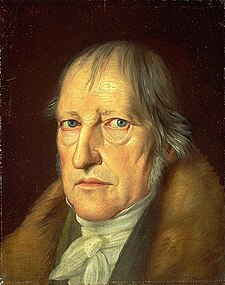Georg Wilhelm Friedrich Hegel
The "Scots" that wis uised in this airticle wis written bi a body that haesna a guid grip on the leid. Please mak this airticle mair better gin ye can. |
Georg Wilhelm Friedrich Hegel (German: [ˈɡeɔɐ̯k ˈvɪlhɛlm ˈfʁiːdʁɪç ˈheːɡəl]; 27 August 1770 – 14 November 1831) wis a German philosopher that wis a major feegur in German idealism. He achieved wide recogneetion in his day an—while primarily influential within the continental tradeetion o philosophie—haes acome increasinly influential in the analytic tradition as well.[2] Although Hegel remains a divisive figure, his canonical stature within Western philosophy is universally recognized.
Georg Wilhelm Friedrich Hegel | |
|---|---|
 Portrait bi Jakob Schlesinger datit 1831, the year o Hegel's daith. | |
| Born | August 27, 1770 Stuttgart, Württemberg |
| Dee'd | 14 November 1831 (aged 61) Berlin, Proushie |
| Residence | Germany |
| Naitionality | German |
| Era | 19t-century philosophie |
| Region | Wastren philosophie |
| Schuil |
|
Main interests | |
Notable ideas | |
Influenced
| |
| Signatur | |
Hegel's principal achievement wis his development o a distinctive airteeculation o idealism, whiles termed absolute idealism,[3] in that the dualisms of, for instance, mynd an naitur an subject an object are owercome. His philosophie o speerit conceptually integrates psychology, the state, history, airt, releegion an philosophie. His accoont o the master–sclave dialectic haes been heichly influential, especially in 20t-century Fraunce.[4] O special importance is his concept o speerit (Geist, whiles an aw translatit as "mynd") as the historical manifestation o the logical concept an the "sublation" (Aufhebung, integration withoot elimination or reduction) o seeminly contradictory or opposin factors: ensaumples include the apparent opposeetion atween necessity an freedom an atween immanence an transcendence. Hegel haes been seen in the 20t century as the oreeginator o the thesis, antithesis, synthesis triad,[5] but as an expleecit phrase it oreeginatit wi Johann Gottlieb Fichte.[6]
Hegel haes influenced mony thinkers an writers that's awn poseetions vary widely.[7] Karl Barth descrived Hegel as a "Protestant Aquinas"[8] while Maurice Merleau-Ponty wrote that "aw the great philosophical ideas o the past century—the philosophies o Marx an Nietzsche, phenomenology, German existentialism, an psychoanalysis—haed thair beginnins in Hegel."[9]
References
eedit- ↑ Butler, Judith, Subjects of desire: Hegelian reflections in twentieth-century France (New York: Columbia University Press, 1987)
- ↑ Paul, Redding (13 Februar 1997). "Georg Wilhelm Friedrich Hegel". Stanford Encyclopedia of Philosophy.
- ↑ This term is actually quite rare in Hegel's writins. It daes nae occur onywhaur in The Science o Logic (tho he comes close in a remerk on p. 124 of the [2010] di Giovanni translation, GW 21.142). In the Encyclopedia presentation o his logic it can be foond anerly at §45R. Greraets, Suchting an Harris note in the introduction tae thair translation o this later text that the term is mair strangly associated wi Inglis muivement in that later pairt o the 19th century (Hackett: 1991, xiii).
- ↑ Owerwhelmingly due tae Alexandre Kojève's influential lecturs published as Introduction à la lecture de Hegel (Paris, 1947), selections translatit intae Inglis by James Nichols as Introduction to the Reading of Hegel (New York, 1969). See, for instance, Aimé Patri, "Dialectique du Maître et de l’Esclave", Le Contrat Social, V, No. a (July–August 196r), 234, citit in Editor's Introduction (vii) on the extent o their influence.
- ↑ Robert C. Solomon, In the Spirit of Hegel, Oxford University Press, p. 23.
- ↑ "Review of Aenesidemus" ("Rezension des Aenesidemus", Allgemeine Literatur-Zeitung, February 11–12, 1794). Trans. Daniel Breazeale. In Breazeale, Daniel; Fichte, Johann (1993). Fichte: Early Philosophical Writings. Cornell University Press. p. 63.
- ↑ "One of the few things on which the analysts, pragmatists, and existentialists agree with the dialectical theologians is that Hegel is to be repudiated: their attitude toward Kant, Aristotle, Plato, and the other great philosophers is not at all unanimous even within each movement; but opposition to Hegel is part of the platform of all four, and of the Marxists, too." Walter Kaufmann, "The Hegel Myth and Its Method" in From Shakespeare to Existentialism: Studies in Poetry, Religion, and Philosophy, Beacon Press, Boston, 1959 (pp. 88–119).
- ↑ "Why did Hegel not become for the Protestant world something similar to what Thomas Aquinas was for Roman Catholicism?" (Karl Barth, Protestant Thought from Rousseau to Ritschl: Being the Translation Of Eleven Chapters of Die Protestantische Theologie im 19. Jahrhundert, 268 Harper, 1959).
- ↑ Maurice Merleau-Ponty (trans. Herbert L. and Patricia Allen Dreyfus), Sense and Nonsense, Northwestern University Press, 1964, p. 63.